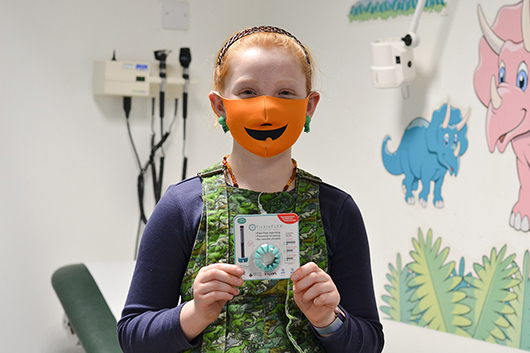Media Release
Date: 16 February 2022
Young patient fundraises for the RUH to help children diagnosed with type one diabetes
A ten-year-old patient at the Royal United Hospitals (RUH) Bath NHS Foundation Trust has donated new kit to help hundreds of other children with type one diabetes.

Maci Beety was inspired to fundraise for insulin injection aids, called TickleFLEX, after being impressed by how they made her regular injections more comfortable.
The accessories are secured onto the end of insulin injection pens and tickle the skin to stimulate the nerves, which can help mask discomfort. The aid also hides the needle from sight.
Maci, from Trowbridge, was diagnosed with type one diabetes in December 2020, and has been receiving support from the Children's Diabetes Service at the RUH.
She organised a number of events in her local community to fundraise, including a 'TypeOnsie' day where her fellow pupils came to school wearing onsies to raise money and awareness. Maci raised enough for over 200 injection aids, and dropped off her donation at a recent hospital appointment.
She said: "I really wanted to be able to help other young people who are diagnosed with diabetes as it can be quite hard. TickleFLEX helped me so I hope they might help other people too."
Type one diabetes causes the level of glucose (sugar) in your blood to become too high. It happens when your body cannot produce enough of a hormone called insulin, which controls blood glucose. People who have type one diabetes need injections of insulin to keep their blood glucose levels under control.
Karen Bradshaw, Lead Paediatric Diabetes Specialist Nurse, said: "When people have type one diabetes like Maci, they need to inject insulin multiple times a day to stay well. This can be tricky, especially at the beginning when people are first diagnosed, but these injection aids can make the process more comfortable and easier to manage for some people.
"We can't thank Maci enough for her fundraising. The donation will make a huge difference to the children and young people who use our service. Through her fundraising, Maci has also helped to raise awareness of type one diabetes, which can affect anyone, at any age."
Type one diabetes symptoms can come on quickly, particularly in children. Common symptoms include:
- feeling very thirsty
- peeing more than usual, particularly at night
- feeling very tired
- losing weight without trying
- thrush that keeps coming back
- blurred vision
- cuts and grazes that are not healing
- fruity-smelling breath
If you, or your child, experience symptoms please see a GP as soon as possible or visit 111.nhs.uk
ENDS

